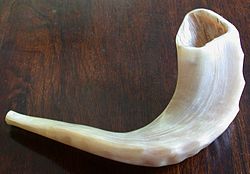Elul

Elul ( Hebrew : אֱלוּל , from Akkadian elūlu ) is the twelfth and last month of the civil Jewish calendar and the sixth of the religious Jewish calendar according to the count in the Jewish calendar . It has 29 days and falls between August and September in the Gregorian calendar .
In the Tanakh this month is simply called "the sixth month", following the numbering of the other months: "The sixth, for the sixth month, was Ira, the son of Ikkesch, from Tekoa." ( 1 Chr 27.9 EU )
The current name of the month "Elul" has its origins in the Akkadian month names of ancient Babylonia , which were used by the Jews during the Babylonian exile between 586 and 536 BC. Were taken over. In the Bible this month name appears only once in the book of Nehemiah : "After fifty-two days, on the twenty-fifth of the month of Elul, the wall was completed." ( Neh 6:15 EU )
The Jewish month name Elul is not the only one that can be traced back to the Babylonian month: September is also called “Eylül” in Turkish .
Elul, also called the “month of grace and forgiveness”, is a time of penance in preparation for the Jamim Noraim , the high holidays of Rosh Hashanah and Yom Kippur on the first and tenth days of the following month Tishri . Elul means something like search , man should prepare for the upcoming days of judgment and reconciliation during this time. The prophet Jeremiah said: "Repent, virgin Israel, return to these cities of yours!" ( Jer 31,21 EU ), which should be a call to repentance and forgiveness to the Jewish people.
Apart from the Shabbat days , the Shofar is blown every morning between Rosh Chodesh Elul, the first day of the month, and the day before Rosh Hashanah, which is supposed to wake people from their thoughtless way of life ( Am 3,6 EU ) . It is also customary to read Psalm 27 daily between Rosh Chodesch Elul and Hoschana Rabba in Tishri . In addition to blowing the shofar, reciting the selichot , special penitential prayers, is an important ritual every day before sunrise. The Ashkenazim end this ritual on the Wednesday before Rosh Hashanah, the Sephardim not until the end of the month.
Many Jews also visit the graves of friends and relatives to commemorate and honor them.
Another custom is to end all letters written in Elul with wishes for a good year - tradition teaches that on Rosh Hashanah the deeds of each person he has committed during the past year are judged and written into the book of life to be written.
The total of forty days between Rosh Chodesh Elul and Yom Kippur are to those forty days of the year 2448 (equivalent to 1313 v. Chr.) The Hebrew calendar remember where Moses to Mount Sinai climbed to the second time the tablets of the Ten Commandments to receive after breaking the first in anger while the people worshiped the golden calf in his absence . The day on which YHWH proclaimed the forgiveness of all sins through Moses has always been the day of forgiveness in Judaism.